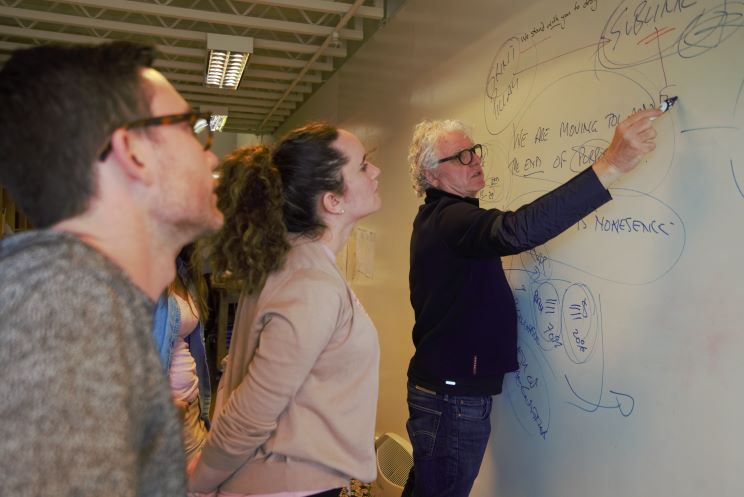Fish can’t see water. So it is with words and cultural differences.
Words are not universal. It’s easy to think that whatever a word means to us means the same to others. Nothing could be further from the truth.
Every word in every language is wrapped in emotion. The non-rational. Edward T. Hall taught us more than 70 years ago that every word has a technical, formal, and an informal meaning. It is the informal meaning that has most power yet many of us assume it’s the formal or technical meaning that matters. Worse, we hear a word and assume our own meaning is the meaning.
It’s a matter of care, a vital place where the connected leader is so much smarter than the too often singularly rational “superior” leader.
Let’s start with the simple truth that every word has an emotional context. Take the word “feedback”. For some of us it’s heard with a frisson of possibility, for others trepidation, for others sanguine neutrality and all emotions in between. This is how we genuinely hear the word and the world. Not through the dictionary definition.
Sincerity, authenticity, fair-dinkum, real, honest, direct, etc… now there’s a cacophony of meaning.
Defining a word doesn’t really help. It’s unarguably rational and simply ensures shallow alignment. I’m tired of hearing in global organisations “…but that’s what everybody says”. That may be true. To assume they mean the same thing is convenient without learning or curiosity. It lacks empathy.
It’s at the visceral where meaning happens. It’s at the emotional where we choose to act, respond and be. Language is imprinted rather than learned. Imprinting is an emotional experience.
Advertisers have long known the significance of the non-rational, the heuristic. Marketers worth their salt never assume a word in one culture means the same in another. It’s why some ads work well in some countries and are disasters in others. A perfect example is when a well-known pharmaceutical company who took an American ad for painkillers and simple redubbed with an English accent for the UK.
What’s wrong with that? Lots as it turns out. Yes, folks in both cultures described in typical research conversations what the job pain killers do: “Relieve pain”. That was the spoken, rational knowing of a pain killer. Turns out that’s actually not true at a behavioural or archetypal level, the place of real meaning. Americans take pain killers to make pain absent, to get on with their lives, so they take it when pain occurs. An ad with someone in pain and then an after-a-tablet shot in no pain, is in an easy, obvious story. Perfect.
That’s not why the English take pain killers at all. They take pain killers to prevent pain, before they are in pain. It’s a way to “stay in control… stiff upper lip and all that”. Images of people in pain are contrary to why they take pain killers. The ad didn’t work, and sales for the brand plummeted. As a marketer and cultural researcher, I found it fascinating. I also learned heaps.
Having just worked with Disney I’m appreciating their brilliance at reinterpreting marketing and advertising locally rather than building global campaigns. They stopped doing global campaigns more than a decade ago. They just don’t work. It’s why audience research must be understood in a cultural context rather than believing any comment is a universal pattern.
Credibility, quality, performance, ambition, transformation are just five examples of words used universally but have different cultural meanings. Let’s take “quality”. In Japan it tends to mean moving towards perfection; in Germany the meaning creates expectation around precise technical standards and in Australia (informally known as “Oz”) something is quality only if it helps me work better with others. Each of those makes little sense unless it’s your cultural milieu.
Culture and meaning are fascinating. As a leader or consultant working in this time of our lives this knowing of language is vital.
How about formality? In Oz, formality often connotes disconnection and lack of relationship and, potentially, disrespect. Formality (especially southern USA) typically is about respect and the honouring of station. Polar opposites. As an Australian to be called Mister or Sir grates.
Credibility? In France credibility comes from breadth of knowledge while in Spain the deepest understanding is credible. In England it’s understated knowledge. Expertise is fundamental. It’s the emotional imprint around expertise that makes the difference.
We know language can be male and female. It also stands to reason countries will have a deep and different knowing even though the words sound the same.
Fons Trompenaars has researched and written brilliantly around culture leading to significant communication, commercial, consulting and marketing differences. For example, his research suggests in Sweden it’s best to start influencing with why something won’t work rather than why it will. Christine Afors’ work on Cultural Imprints supported this.
The way I open a workshop in other countries, including the USA, is subtly different from how I open in Australia. The difference is critical in speeding up intimacy and therefore listenability. Certainly, one can open the same way… however, the subtle shift can make a world of accelerated difference.
Working in IBM many years ago I put up the word “change”. Formally, it turned out to mean the same in Japan, Australia and the USA. Turns out the cultural imprint of that apparently simple word “change” is massively different.
For one culture it connoted broken, for another it connoted possibility, for another it meant tragedy and loss. It’s not that the word “change” was wrong to use. Rather it was the subtlety of the country archetype that mattered. Consequently, leading change required differing sensibilities. As someone who cares deeply about the future of work and meaning, words really matter.
It was fascinating to learn that “changes” rather than “change” was way more acceptable and hearable in Japan and Australia. The rational thinker will dismiss the difference. The connected leader will find it fascinating.
Choose your words carefully. It is semantics and it matters. A lot.
Think how words like transformation, strategy, purpose occur to you. It won’t be the same to others. Be curiously careful…
It’s time to find communicating, energising linguistic pathways that connect rather than fragment and create distance.
Words and language make for a beautiful difference. They matter. They talk to the heart and the soul. Poor leaders and ineffectual influences show little linguistic care.
Real leaders care and connect. It’s about beautiful differences and vital choices.




